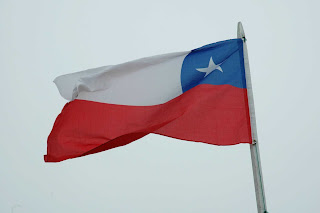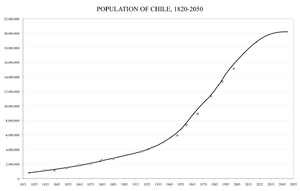Friday, February 27, 2009
RANDOM FACTS
CIA World Facts
The following demographic statistics published by Wikipedia are from the CIA World Factbook, unless otherwise indicated. These stats contradict my Spanish teacher's impression of an imbalance in the current birth ratios between boys and girls, though I do not dispute her report that when her daughter was born, there were nine other girls and only one boy born during the same week at the Pucón hospital.
[edit]Population
- 16,284,741 (July 2007 est.)
[edit]Age structure
- 0-14 years: 24.1% (male 2,010,576/female 1,920,951)
- 15-64 years: 67.4% (male 5,480,703/female 5,492,988)
- 65 years and over: 8.5% (male 576,698/female 802,825) (2007 est.)
[edit]Median age
- total: 30.7 years
- male: 29.8 years
- female: 31.7 years (2007 est.)
[edit]Population growth rate
- 1.027%(2001 est.)
- 0.916% (2006 est.)
[edit]Death rate
- 5.87 deaths/1,000 population (2007 est.)
[edit]Net migration rate
- 0 migrant(s)/1,000 population (2007 est.)
[edit]Sex ratio
- at birth: 1.05 male(s)/female
- under 15 years: 1.047 male(s)/female
- 15-64 years: 0.998 male(s)/female
- 65 years and over: 0.718 male(s)/female
- total population: 0.982 male(s)/female (2007 est.)
[edit]Infant mortality rate
- total: 8.36 deaths/1,000 live births
- male: 9.09 deaths/1,000 live births
- female: 7.59 deaths/1,000 live births (2007 est.)
[edit]Life expectancy at birth
- total population: 76.96 years
- male: 73.69 years
- female: 80.34 years (2007 est.)
[edit]Total fertility rate
- 1.98 children born/woman (2007 est.)
[edit]HIV/AIDS
- People living with HIV/AIDS: 26,000 (2003 est.)
- Deaths: 1,400 (2003 est.)
[edit]Ethnic groups
| White * | Mestizos | Amerindian |
|---|---|---|
| 52.7% | 42.7% | 4.6% |
*N.B.In the case of Chile, the percentages were taken from the study of Lizcano (2005)[2], but these vary according to other studies, 30% of Chileans as white and 65% as either castizo ("white mestizo").[16] in Another study Esteva-Fabregat (1988), a white majority that would exceed 60% of the Chilean population. In the 2002 census reported 4.6% of Indians in the country (most also varying degrees of miscegenation).
Tuesday, February 24, 2009
White Water Kayaking



Sunday, February 22, 2009
More Saltos in the Neighborhood

Saturday, February 21, 2009
Cutting The Lawn Makes A Difference
Wednesday, February 18, 2009
Our Road Trip
Monday, February 16, 2009
Pan American Highway

The Pan American Highway starts in Alaska and runs south all the way through Chile to end on the coastal island of Chiloé. For our first excursion we determined to travel the highway as far as the port town of Castro, near the end of the road, and see the sights along the way.


In the resort town of Panguipulli we visited the lattice towered parish church with a statue of the Virgin donated by the town's Arab community, and saw the beach frequented by a summer crowd of Chilean touristas.
 One refreshing beach treat is a drink called a mote con huesillo which is widely available and consists of peach nectar with a helping of softened triticale wheat kernals.
One refreshing beach treat is a drink called a mote con huesillo which is widely available and consists of peach nectar with a helping of softened triticale wheat kernals.


Some local sculpture at
Llanquihue


Salmon hatcheries provide a significant industry in this part of Chile. We saw dozens of trucks like this one loaded with oxygen-fed tanks full of salmon hatchlings being transported from the crystaline streams of the region to coastal fish farms where they will grow to maturity.

A jetboat approaches the Saltos de Petrohué for a spectacular close-up view of the waters pouring out of the Lago Todos Los Santos.

The Volcan Orsono overlooks the lakeside port of Petrohué with it's amazingly blue waters from the dissolved minerals.
 The Lago Todos Los Santos provides one of the ways east through the cordierra to Argentina and the resort area of San Carlos de Bariloche, famed for the five lakes and the winter ski center of Cerro Catedral.
The Lago Todos Los Santos provides one of the ways east through the cordierra to Argentina and the resort area of San Carlos de Bariloche, famed for the five lakes and the winter ski center of Cerro Catedral.
Henry and Jose wish you a Happy Valentine's Day as we get back on the road to continue our journey to the south.
 Henry cheers aboard our ferry crossing the Chacao Channel. We watch the many pelicans, sea lions, and cormorants active alongside the boat. The water is clear and cold.
Henry cheers aboard our ferry crossing the Chacao Channel. We watch the many pelicans, sea lions, and cormorants active alongside the boat. The water is clear and cold. A spectacular view from the road going down the west coast south of Ancud on the way to see the penguin colony on the wonderfully wild Pacific beach of Mar Brava.
A spectacular view from the road going down the west coast south of Ancud on the way to see the penguin colony on the wonderfully wild Pacific beach of Mar Brava.
 Susan shows the seaweed that decorates the beach. Then it's our turn to go out to see the penguinos.
Susan shows the seaweed that decorates the beach. Then it's our turn to go out to see the penguinos.





Sea ducks apparently don't migrate.
After another typical Chilean breakfast at our hotel in Ancud we got back in the truck under ominous gray skies.
We celebrated the excitement of seeing the penguin rookery by posing as a penguin family on vacation.
Then we were off again to travel the coastal road on the east side of the island to spend our last night in Castro, Chile's third oldest city.
 Along the eastern coast of Chiloé are numerous salmon farms that provide many jobs here.
Along the eastern coast of Chiloé are numerous salmon farms that provide many jobs here.

After checking into our hotel, we got totally soaked walking through the rain to eat lunch at Octavio's, a very good seafood restaurant on the harbor where Richard enjoyed his first time eating eel, the house specialty.

 The Castro Cathedral is on UNESCO's World Heritage list and is beautifully constructed of wood with a corrugated metal exterior and molded shingles on the front.
The Castro Cathedral is on UNESCO's World Heritage list and is beautifully constructed of wood with a corrugated metal exterior and molded shingles on the front.
 It was rebuilt in 1912 after being damaged by a cyclone the year before.
It was rebuilt in 1912 after being damaged by a cyclone the year before.Castro is known for its palafitos, houses on stilts over the water, which have become a national monument even though they have been mostly rebuilt with proper sewer connections since the 1960 earthquake.
 The rainy weekend suddenly brightened for our return trip back up the Pan American Highway by a glorious arcoiris, or rainbow, over the Castro fjord.
The rainy weekend suddenly brightened for our return trip back up the Pan American Highway by a glorious arcoiris, or rainbow, over the Castro fjord.
Tuesday, February 10, 2009
This Country Is AMAZING
Sunday, February 8, 2009
Words
Saturday, February 7, 2009
Ojos de Caburgua
 About 25km west of Pucón the paved road ends at Lake Caburgua, a small, but exclusive resort where the current President of Chile, Michelle Bachelet, has a vacation home. Unlike most lakes in the region which were gouged out by glacial action, Lago Caburgua was formed behind a huge landslide that blocked the valley in ancient times. A few kilometers south, water, leaving the lake in underground passages through the volcanic rock, bursts out in two dramatic waterfalls called the Ojos de Caburgua. We made a morning excursion, along with hundreds of Chilean tourists, to view the falls. Returning home by an unpaved road that followed the Rio Trancura, we got to see some of the rapids that the popular whitewater rafting trips experience. We were able to cross the river back to Pucón over a narrow suspension bridge just in time for the wonderful lunch prepared for us by our housekeeper, Louisa. Life is good!
About 25km west of Pucón the paved road ends at Lake Caburgua, a small, but exclusive resort where the current President of Chile, Michelle Bachelet, has a vacation home. Unlike most lakes in the region which were gouged out by glacial action, Lago Caburgua was formed behind a huge landslide that blocked the valley in ancient times. A few kilometers south, water, leaving the lake in underground passages through the volcanic rock, bursts out in two dramatic waterfalls called the Ojos de Caburgua. We made a morning excursion, along with hundreds of Chilean tourists, to view the falls. Returning home by an unpaved road that followed the Rio Trancura, we got to see some of the rapids that the popular whitewater rafting trips experience. We were able to cross the river back to Pucón over a narrow suspension bridge just in time for the wonderful lunch prepared for us by our housekeeper, Louisa. Life is good!












